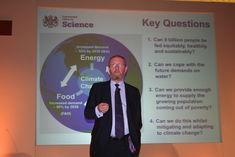
Professor John Beddington, chief scientific adviser to the government, has assured the UK’s farming industry that the government is getting to grips with the food security issue.
“There has been major input from the cabinet on this and the prime minister raised the issue at the G8 summit,” he told more than 300 representatives of the UK farming industry at the English Farming & Food Partnerships conference.
But Beddington stressed how interconnected the main problems giving rise to the issue of food security are, citing climate change, urbanisation, population growth, poverty alleviation and rising demand for energy and water all key worries.
“There is an interconnection between food, water and energy security, which are all intimately linked with climate change,” said Beddington. “In the future agriculture needs to generate 50 per cent more production with less land and less water, using less energy and pesticide and releasing fewer emissions.”
Beddington unveiled some startling statistics at the conference. “The World Bank estimates 100m people could fall into extreme poverty due to soaring food and energy prices. Net population increase is occurring at a rate of 6m a month, or 72m a year - most will be born into poverty, with a life expectancy in the mid-30s, and they will have three children before they die. This is not a welcoming world for them.”
By 2030, 60 per cent of the world’s population will live in cities, and that will pose problems for land, water, disease, sanitation and food production, said Beddington, as well as pushing up demand for meat, dairy and processed foods. “The reduction of poverty will come with unintended consequences for food production,” he said.
“The UN estimates that world food production must rise by 50 per cent by 2030 to meet increased demand - an enormous strain when we are not making any more land and availability of fresh water is falling.”
One in three people are already facing water shortages, he added, and the UN predicts that total world water demands will increase by more than 30 per cent by 2030. Total world energy demands are also predicted to increase by more than 50 per cent to 2030.
Better crop protection methods to reduce losses will be crucial in the future to boosting production, said Beddington, and the use of biotechnology could play an important role in this. “It doesn’t have to be GM, although that must be considered for drought and saline tolerance - but there are plenty of targeted and predictive non-GM plant breeding techniques,” he said.
“All the issues [leading to food security concerns] are inter-related and we must look at the evidence base - we cannot be prejudiced, we must be rational.”
Beddington left delegates with a number of questions to think about, asking: “Can nine billion people be fed equitably, healthily and sustainably? Can we cope with future demands on water, and provide energy for people coming out of poverty? And can we do all this while mitigating and adapting to climate change?”



